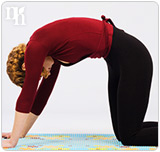
If you've just had a hysterectomy, there's no doubt that you're feeling winded and your muscles are sore. However, there are simple ways to get back to your old self without compromising your recovery. For example, an exercise routine that's light enough not to risk injury during your healing process can also help you to ease back into your life after the surgery. Keep reading to learn how you can get back into the swing of things.
Post-Hysterectomy Experience
Women who have both their ovaries removed during their hysterectomy will experience surgical menopause. Because the ovaries are gone, the body no longer produces its previous levels of hormones like estrogen and progesterone. Many post-op women feel symptoms of hormonal imbalance - the classic menopause symptoms. Common ailments include hot flashes, mood swings, weight gain, and vaginal dryness. Nevertheless, there are many ways to recover after a hysterectomy and avoid troublesome symptoms.
Healthy Diet
Now more than ever, it is essential to eat a balance diet rich in vitamins and minerals. Generally speaking, meals rich in colorful fruits and vegetables help women get all of the nutrients they need. Healthy substitutions can also be made, such as eating beans or poultry in place of fat-heavy red meat. Phytoestrogenic foods - those than contain estrogen from plants - can also help reverse the sudden drop in hormones post-op. Foods rich in phytoestrogens include tofu, chickpeas, and flaxseed, among others.
Exercise Program

Exercising after a hysterectomy can help prevent post-operation depression as well as symptoms of surgical menopause. Physical activity also released endorphins, the brain chemical responsible for fighting pain and low moods. During recovery, it is necessary for exercises to be low impact. Walking and yoga are great examples of healing exercises that can be practiced without overdoing it. Taking a walk around the park for 10 minutes a day works as a manageable starting point.
Bioidentical Hormones
For many women, healthy lifestyle habits can help improve recovery after a hysterectomy and minimize the occurrence of surgical menopause symptoms. Nevertheless, a healthy diet and exercise routine will not be enough for some women, who may experience severe symptoms. In such cases, bioidentical hormones are an option. This medication is synthesized in laboratories to match the body's natural estrogen and progesterone. While the idea sounds good on paper, research on the safety and effectiveness of bioidentical hormones is still inconclusive, and there may be long-term risks. Post-op women with intense symptoms of hormonal imbalance should speak to their doctor for the best course of action.
Having a hysterectomy can be a difficult experience, but recovery can be made smoother by non-intrusive lifestyle adjustments. Though post-op women are more susceptible to menopause symptoms, a healthy diet and exercise can help alleviate them. Medications like bioidentical hormones are also a last resort option for women with persistent or intense symptoms. Click on the following link to learn more about alternatives to bioidentical hormones.
